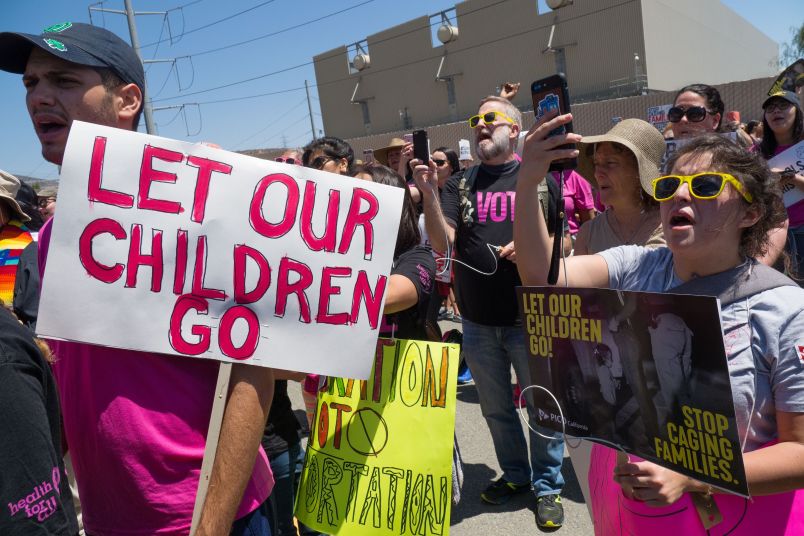On the heels of a federal court in California blocking President Trump’s policy of separating immigrant families, a federal judge in Washington is giving the government about a week to show it is working in good faith to start the process of putting the split-up families in contact and reunifying them.
U.S. District Judge Paul Friedman did not grant the temporary restraining order requested by lawyers seeking immediate relief for the three Central American political asylum seekers held in South Texas whose children have been taken away from them — pointing to the Tuesday night federal court ruling demanding all separated families be reunited within 30 days.
Also pointing to that ruling, the Justice Department promised Wednesday to immediately provide the suing migrant parents the addresses where their children are held, the phone numbers of the case managers handling their children’s cases, arrangements for phone calls with their children at least twice a week, and an estimated date of reunification.
“I’m wrestling with whether you satisfy the irreparable harm test” in light of the ruling and the government’s promise to comply, Friedman told the plaintiffs. “I’m having trouble finding the residue of irreparable harm.”
The judge did, however, order the Trump administration and the plaintiffs’ attorney to report back to him in a week on whether the promises are being met. Rather than rejecting the migrant families’ call for a temporary restraining order, Friedman is holding it in abeyance, and made clear in the courtroom Wednesday afternoon that he won’t hesitate to use the legal tool if needed.
“If this system fails, if the case managers don’t act in good faith or if you can’t get the information you need, come back and see me,” he told the immigrant parents’ attorney. “You may find something next week that convinces me.”
Trump administration attorneys promised Friedman that they would immediately put the plaintiffs in contact with government case managers who could give them information about the well-being of their children and an estimated date for the reunification.
Friedman noted, however, that there are “a lot of moving parts” to the situation, including the question of whether the Trump administration will attempt to appeal or modify the California ruling — something Justice Department attorney Sarah Fabian could not speak to at Wednesday’s hearing. She did, however, note that an appeal effort would likely take a long time to play out, and the government would likely work towards compliance in the meantime.
Jerome Wesevich, the attorney for the group Texas Rio Grande Legal Aid who is representing the three families, told TPM after the hearing that he hoped the “strong” ruling out of California forces the government to comply with what his lawsuit is seeking: that parents be put in immediate phone contact with their children, receive full reports from the Trump administration about any illnesses or injuries their children may have suffered, and be given an estimated date for reunification.
“The legal landscape has changed dramatically since we pushed the button on this case,” he said. “Thankfully, it’s in the right direction so far. Now, we want to keep the momentum going to fix this problem and end this sad chapter in American history.”
But Wesevich emphasized that, in the meantime, his clients remain “in anguish.”
“Right now, one of my clients is sitting in a blue jumpsuit in a detention center near Port Isabel, Texas,” he said. “He was separated from his daughter on June 4. He hasn’t seen or talked to her. He doesn’t know anything about her wellbeing. The government has no justification for this, because he’s not under any criminal process.”







This is America.
May this incarnation crash and burn.
And I will wager they have no idea where the child is, nor do they care.
The party that proclaims in its platform that “The rule of law is the foundation of our Republic” says that it is considering complying with a court order. How noble.
So, was Jefferson Beauregard Session III just planning on separating immigrant families, and never reuniting them? Parents would be incarcerated, and the children deported without them? Or, parents deported but children retained here in chain link summer camps? Or parents and children deported separately? Did the DOJ even stop to think about the eventuality that these families would ever need to be reunited? All of the evidence suggests that they did not even obtain the basic information necessary from the parents or the children to make any reunification even possible! Thousands of families may have been permanently separated! This callous behavior could easily be prosecuted as a war crime!
Doesn’t matter. Trump will have his rubber stamp SCOTUS very shortly and will completely ignore any court orders in the meantime, laughing all the way to Faux News where Hannity will be shouting into his mic, spittle a-flyin’ “What the fuck are you gonna do about it…huh? WE CONTROL LAW ENFORCEMENT AND THE MILITARY SO WHAT THE FUCK ARE YOU GONNA DO ABOUT IT?”
You think Trump’s worried about how the SCOTUS will rule on POTUS self-pardons NOW? HAHAHAHAHAHAHA!!!
The only question remaining for me is WHEN Trump tries to use martial law, not whether. Sanctuary cities? States thwarting the prison industrial complex’s reliance on marijuana over-criminalization to lock up minorities and ilne their pockets with investments in private prisons? Which one…hmmmm…